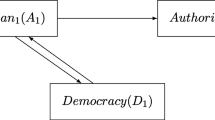Abstract
The most striking feature of liberal democracies is the coexistence of large inequalities of wealth with a roughly egalitarian distribution of voting power. So far most attempts to explain this have asked ‘why don’t the poor form a coalition to expropriate the rich?’ This paper argues that this is not necessarily the best way to interpret the problem and attempts to provide an alternative unified political-economic model that is more consistent with standard assumptions about voting. This is done by studying what would happen if every possible coalition could form in a wealth distribution game. Among the main findings is that, if the marginal contribution of every individual to production is increasing sufficiently, there is a stable distribution of the product. This may include the egalitarian distribution. If individuals are not so valuable there is no stable distribution.
Similar content being viewed by others
References
Aumann, R., & Kurz, M. (1977). Power and taxes. Econometrica, 45, 1137–1161.
Aumann, R., & Kurz, M. (1978). Power and taxes in a multi-commodity economy. Journal of Public Economics, 9, 139–161.
Dalton, R. J. (2000). The decline of part identifications. In R. J. Dalton & M. P. Wattenberg (Eds.), Parties without partisans (pp. 9–36). Oxford: Oxford University Press.
Downs, A. (1957). An economic theory of democracy. New York: Harper and Row.
Gramsci, A. (1971). Prison notebooks. New York: International Publishers.
Gunn, J. (1988). Jeremy Bentham and the public interest. In J. Lively (Ed.), Modern political theory from Hobbes to Marx Key debates. London: Routledge.
Hamilton, A., Madison, J., & Jay, J. (1961). The federalist papers. New York: New American Library.
Hausken, K. (2005). Production and conflict models versus rent seeking models. Public Choice, 123, 59–93.
Hayek, F. (1973). Economic freedom and representative government. London: London Institute for Policy Studies.
Hirshleifer, J. (1995). Anarchy and its breakdown. Journal of Political Economy, 103(1), 27–52.
Ichiishi, T. (1983). Game theory for economic analysis. New York: Academic Press.
Miliband, R. (1969). The state in capitalist society. New York: Basic Books.
Mueller, D. (2003). Public choice III. Cambridge: Cambridge University Press.
Peck, R. (1986). Power and linear income taxes: an example. Econometrica, 54, 87–94.
Peleg, B., & Sudholter, P. (2003). Introduction to the theory of cooperative games. Netherlands: Kluwer.
Przeworski, A. (1990). The state and the economy under capitalism. Chur: Harwood Academic Publishers.
Przeworski, A. (2005). Democracy as an equilibrium. Public Choice, 123, 253–273.
Putterman, L. (1996). Why have the rabble not redistributed wealth? In J. Roemer (Ed.), Property relations, incentives and welfare (pp. 359–389). New York: St. Martin’s Press.
Ray, D., & Vohra, R. (1999). A theory of endogenous coalition formation. Games and Economic Behaviour, 26, 286–336.
Roemer, J. (1985). Rationalizing revolutionary ideology. Econometrica, 53, 85–108.
Roemer, J. (1999). The democratic political economy of progressive income taxation. Econometrica, 67, 1–19.
Roine, J. (2006). The political economy of not paying taxes. Public Choice, 126, 107–134.
Schumpeter (1975). Capitalism socialsim and democracy. New York: Harper.
Tullock, G. (1967). The welfare costs of tariffs, monopolies and theft. Western Economic Journal, 5, 224–232.
Tullock, G. (1971). The charity of the uncharitable. Western Economic Journal, 9, 379–392.
Wallerstein, M. (1996). Comment. In J. Roemer (Ed.), Property relations, incentives and welfare (pp. 390–393). New York: St. Martin’s Press.
Ward, B. (1961). Majority rule and allocation. The Journal of Conflict Resolution, 5, 379–89.
Author information
Authors and Affiliations
Corresponding author
Rights and permissions
About this article
Cite this article
Coram, A. The political-economy of conflicts over wealth: why don’t the rabble expropriate the rich?. Public Choice 136, 315–330 (2008). https://doi.org/10.1007/s11127-008-9298-6
Received:
Accepted:
Published:
Issue Date:
DOI: https://doi.org/10.1007/s11127-008-9298-6




